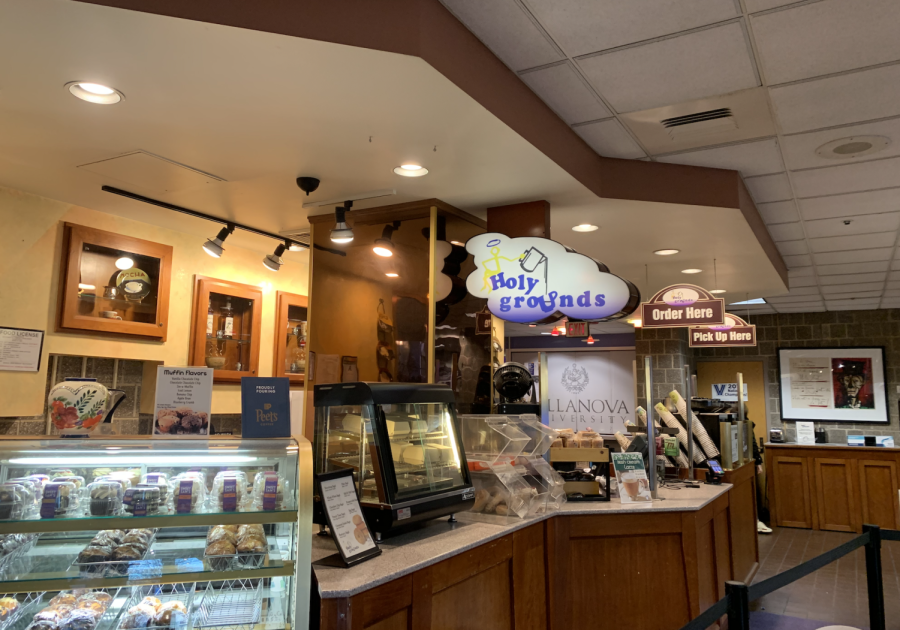The Final Straw: Agave Needs to Go
Courtesy of Jackie Thomas/Villanovan Photography
Unreliable straws at Holy Grounds have become a point of contention for students.
March 30, 2022
It’s a frequent occurrence: you’re rushing to your next class and stop to pick up a coffee at Holy Grounds. What should be a quick pit stop turns into a lengthy and frustrating endeavor, as you tear through multiple straws attempting to find one that doesn’t have the seemingly ubiquitous crack down its side.
After leaving a pile of crumpled wrappers and cracked straws in your wake, exasperated, you likely settle for one with as minimal a crack as possible.
On the rare occasion that you actually find a working straw, it’s apt to break in the middle of your lecture, causing it to make rasping, gurgling noises as you sip, thus providing a sufficiently uncomfortable experience for both yourself and everyone within hearing distance.
This is perhaps one of the hallmarks of the Villanova student experience. A quick scroll on YikYak unearths testimonials such as “I’m on my final straw… and it’s one of the brown ones from Holy Grounds with a hole,” and the more straightforward “I hate these straws.”
Even mentioning the straws in casual conversation sparks a litany of complaints, with people lamenting the inconvenience, and even relaying instances wherein their tongues were cut by a cracked straw.
“It’s just really annoying and wasteful. I’m going through four straws for one drink,” said one freshman.
“It’s super frustrating when you’re running late and it’s just an unnecessary delay,” said another.
These grievances, while trivial at face value, compound upon a multitude of complaints that have been brought up against Villanova’s provision of basic services and necessities.
The shortages in housing and staffing concerns that have arisen at Villanova are understandably difficult to reconcile in the midst of continued COVID-19 insecurity and inflation, but finding a replacement for the current straws is a relatively simple fix that has the capacity to greatly improve the morale of Villanova’s students. Furthermore, this action would prove to the student body that Villanova listens to, and respects, its concerns and complaints – even on small matters.
Granted, it’s incontestable that biodegradable straws are infinitely better for the environment than plastic, breaking down in a matter of months – or even weeks – as opposed to the conventional plastic’s 500-year decomposition process.
As the University attempts to progress towards a more sustainable future, it’s sensible to tackle the “low-hanging fruit” of plastic straws, which, despite accounting for only 1% of the planet’s waste, are an essential and relatively simple stepping stone towards transitioning entirely from single-use plastics.
However, the agave straws used at Villanova are not going to end pollution. While an environmentally-conscious alternative would be optimal, a return to plastic straws would not carry a horrific detriment to the environment. NBC reports that the movement for biodegradable straws will barely make a dent in annual plastic pollution.
What’s more, substituting eco-friendly alternatives for plastic straws places the onus of sacrificing comfort and shouldering the blame for pollution on the everyday consumer, as opposed to the undisputed largest culprits in plastic-related waste: major corporations.
Companies such as Coca Cola, Pepsi and Nestle have all been cited as the largest contributors to plastic pollution, yet most sustainability movements focus on consumers whose actions ultimately have little bearing on pollution. Sadly, our well-intentioned efforts are largely insignificant in the grand scheme.
Do the pros of Villanova’s agave straws outweigh the cons? Ultimately, no. The infinitesimal benefit provided by agave straws is undermined both by its pointed functional flaws as well as their use in plastic cups with plastic lids.
In the wake of widespread complaints, the University should find a more suitable, ideally similarly sustainable, alternative.


